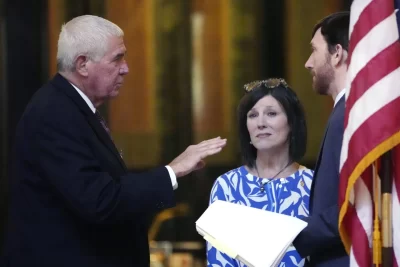
Representative Gene Newman, R-Pearl, says you can’t advertise to sell cocaine – and abortion should be the same.
“It’s as simple as this. You can’t advertise to sell cocaine. You can’t advertise to sell anything that’s illegal. And that’s all this does. If something is illegal, you cannot advertise for it.”
But other lawmakers disagree.
Newman’s bill, House Bill 31, would prohibit the advertisement of abortion in Mississippi. It has been assigned to the House Public Health and Judiciary B committees.
Public Health Chair Sam Creekmore IV, R-New Albany, said that although he is pro-life, he doesn’t believe anything restricting advertisement should be written into law. He plans to kill the bill.
“I’m pro-life, but we have civil liberties and rights,” Creekmore said. “We advertise for what some people think are not good things. We respect the rights of free commerce and civil liberties. I don’t think that should be something we legislate.”
Creekmore said he met with Newman because “when people have bills, I like to hear their side.”
But, he went on, “Gene Newman and I reached an understanding that I’m not going to bring it out [for a vote].”
Newman said he got the idea to write the bill last legislative session during conversations about crisis pregnancy centers.
CPCs are counseling centers that typically offer little or no medical services but give out freebies such as diapers and pregnancy tests. Critics say the centers often lure women in under false pretenses, such as appearing to offer abortion services, and then steer women away from abortions through deception, fear-mongering, or scheduling appointments so far out in advance that by the time they come around, abortion is no longer feasible.
Last year, CPCs got $10 million in tax credits and were touted as the primary solution to help women in the wake of the overturning of Roe v. Wade and a near total abortion ban in Mississippi.
According to Newman, CPCs are still being overshadowed by abortion advertisements.
“I learned they have problems when they try to advertise their services, they get overrode by abortion agencies running ads in Mississippi, so it’s very hard for them to get their word out online. It kind of aggravated me that you got people in here advertising for something that’s illegal in the state of Mississippi.”
With Creekmore planning to not bring it out for a vote, the bill is poised to die in committee.
Research shows that currently, the abortion ban has stopped just over a quarter of Mississippi abortion seekers — likely those with the lowest social determinants — from attaining an abortion. The other roughly 75% of abortion seekers have found ways to travel out of state or mail order abortion medication online from overseas.
However, it’s not clear that the abortion ads the bill would ban — not including web sites that list and give directions to clinics in other states or how to obtain medication — have played any role in those numbers.







